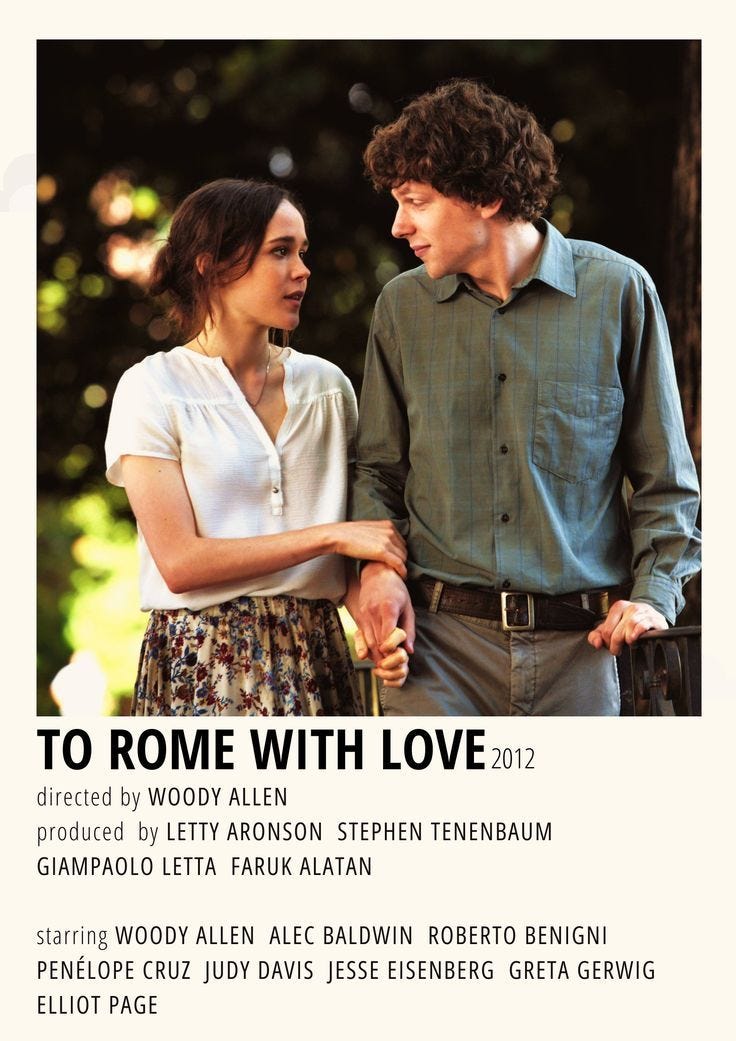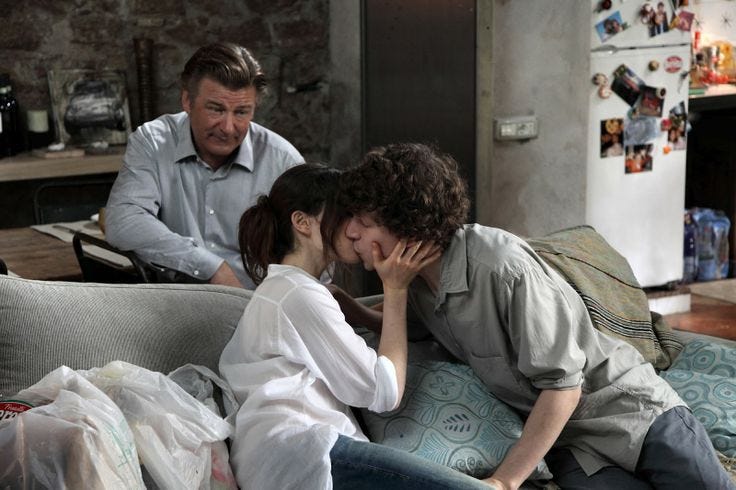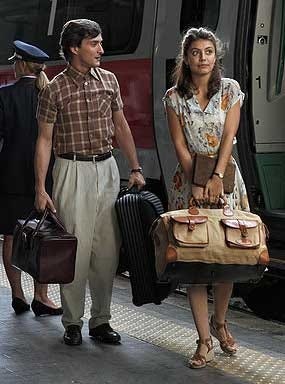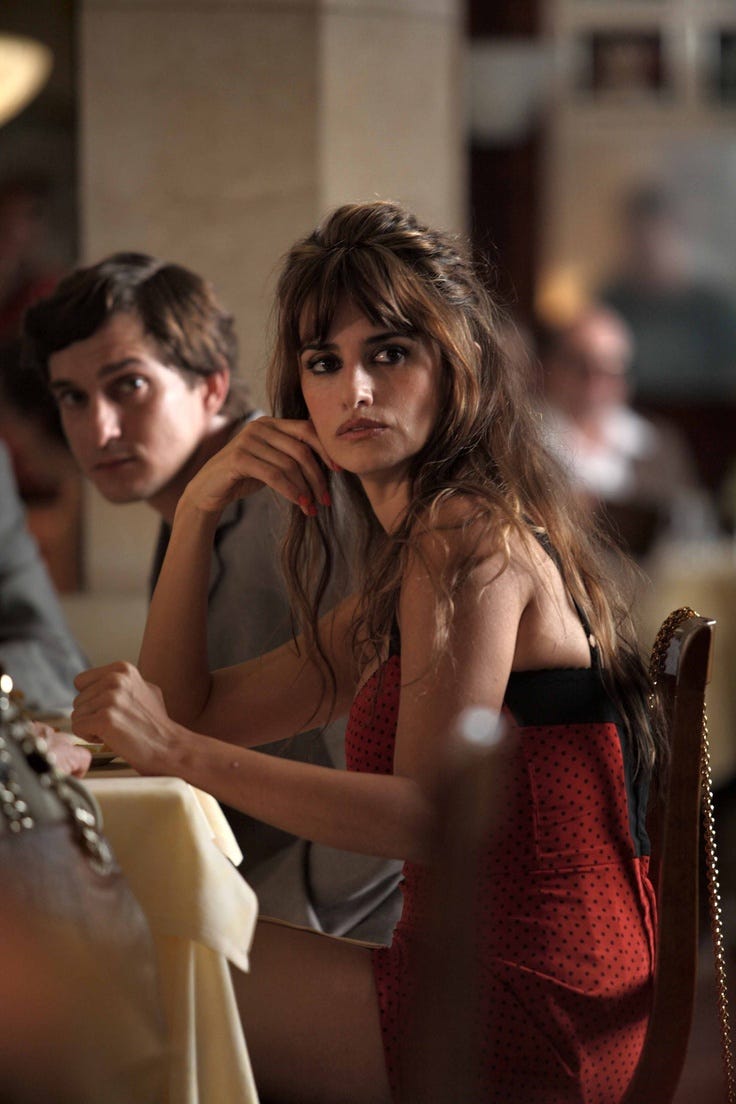Happy Sunday and welcome back to Giselle daydreams! Today marks the last post from my cinema series which featured 5 films which took place in Italy. I’m ending with To Rome with Love, a film that brings me laugher and daydream while transporting me to the Eternal City.
I think it’s important to mention that this essay is purely about To Rome with Love, and I won’t be discussing Woody Allen’s personal life. I appreciate his films, but it doesn’t mean I condone his personal life choices.
To Rome with Love is a romantic comedy film written and directed by Woody Allen, and released in 2012. The film features an ensemble cast including Alec Baldwin, Roberto Benigni, Penélope Cruz, Jesse Eisenberg, Ellen Page, and Woody Allen himself. To Rome with Love is a whimsical exploration that explores various themes through interconnected stories set in the picturesque city of Rome.
The film is a love letter to Rome, with its beautiful landscapes, historical sites, and vibrant culture. The city serves as a backdrop that ties the different stories together, adding a layer of enchantment and romance. The film is divided into four separate narratives that intertwine loosely through the city of Rome.
Leopoldo Pisanello, played by Roberto Benigni, is an ordinary man who suddenly finds himself inexplicably famous for no apparent reason, highlighting the arbitrariness and fleeting nature of celebrity status. Leopoldo’s Story explores the capricious nature of fame. He becomes the centre of media attention and experiences both the perks and downsides of celebrity life. Leopoldo's story underscores the media's role in amplifying and distorting reality. His life becomes a spectacle, demonstrating how fame can invade and disrupt one's personal life. Leopoldo experiences both the allure and the invasiveness of sudden celebrity, highlighting how fame can be both intoxicating and isolating. The media attention and public scrutiny he faces highlight the superficiality and fleeting nature of celebrity status. Allen critiques how fame can transform a person's life and perception in society, often without any substantial reason or merit.
John, played Alec Baldwin, is an architect visiting Rome, where he once lived as a young man. He meets Jack, played by Jesse Eisenberg, a young architecture student who reminds John of his younger self. Jack falls for his girlfriend's best friend, Monica, played by Ellen Page, despite John's warnings about her manipulative nature. The narrative of John and Jack examines romantic entanglements and the complexities of love. John's mentorship of Jack reflects on youthful infatuation, his past mistakes, and the complexities of navigating love and desire, especially when faced with temptations and uncertainties, whereas Jack navigates his attraction to Monica. This storyline explores infatuation, temptation, and the complexities of romantic relationships. It contrasts youthful infatuation with mature reflection, highlighting the cyclical nature of romantic entanglements.
Antonio, played by Alessandro Tiberi, and Milly, played by Alessandra Mastronardi, a newlywed couple, navigate misunderstandings and temptations during their separate adventures in Rome. A series of misunderstandings leads Antonio to pretend that a prostitute, Anna, played by Penélope Cruz, is his wife, while Milly encounters a famous actor and has her own adventure. Their misadventures underscore themes of trust, fidelity, and the challenges of maintaining a stable relationship in the face of external influences. The comedic elements in their storyline emphasise Allen's exploration of human foibles and the absurdities of romantic pursuits.
Jerry, played by Woody Allen himself, becomes fascinated when he discovers that his daughter Hayley's boyfriend Michelangelo's father, Giancarlo, played by Fabio Armiliato has a remarkable singing talent — when in the shower. Jerry's obsession with making Giancarlo a star, despite the absurdity of needing to sing in the shower, underscores the unpredictable nature of artistic success. This storyline humorously examines the quest for artistic validation and the arbitrary nature of talent recognition. It satirises the entertainment industry's obsession with superficial talents and celebrity culture.
Through these intertwined stories, Allen reflects on the choices people make and the consequences they face. Each character grapples with personal dilemmas, whether it is pursuing fame, navigating romantic entanglements, or seeking artistic fulfilment. The film suggests that life's outcomes are often unpredictable and influenced by random events, echoing existential themes of chance and fate.
Allen employs an ensemble cast, each representing a different facet of life and love in Rome. The interconnected narratives unfold simultaneously, creating a tapestry of diverse experiences and perspectives in which each story brings a unique perspective on life in Rome.
The film adopts a non-linear narrative structure, moving fluidly between different storylines without strict chronological order. This approach allows Allen to juxtapose contrasting themes and character arcs, enhancing the film's depth and complexity. This approach also reflects the complexity and interconnectedness of life in a bustling city like Rome. This narrative style keeps the audience engaged and curious about how the stories will unfold.
To Rome with Love showcases the beauty and charm of Rome through visually stunning cinematography. The film celebrates Rome as a cultural hub where art, music, and history converge. Its picturesque settings, including iconic landmarks such as the Colosseum, Trevi Fountain, and Spanish Steps serve as backdrops that enhance the film's romantic atmosphere, quest for adventure and self-discovery, as well as cultural richness.
Characters from different backgrounds and cultures converge in Rome, leading to cultural exchanges and cross-cultural interactions. These interactions enrich the film's exploration of universal themes such as love, ambition, and the pursuit of happiness. Through its diverse characters and their intertwining stories, To Rome with Love reflects on life's unpredictability and the consequences of individual choices. Each character grapples with personal dilemmas and existential questions, highlighting the uncertainties and complexities of human existence.
Allen employs a whimsical tone, using humour and light-hearted scenarios to address deeper themes such as fame, love, and artistic pursuit. Allen's trademark humour and wit permeate the film, offering comedic relief while at the same time delivering incisive social commentary. This approach makes the film engaging and entertaining while prompting reflection on its themes. The comedic elements lighten the exploration of existential themes, making the film accessible and entertaining to a wide audience.
The film suggests that life's outcomes are often influenced by random events and chance encounters. It explores how seemingly insignificant moments can have profound impacts on individuals' lives, echoing existential themes of fate and free will.
The film's soundtrack, featuring classic Italian music, complements the romantic ambience and cultural setting of Rome. Music enhances emotional moments and underscores the film's nostalgic tone.
To Rome with Love is a delightful exploration of love, fame, and artistic ambition set against the enchanting backdrop of Rome. Woody Allen's nuanced storytelling, infused with humour and wit, and visually captivating cinematography creates a film that is both entertaining and thought-provoking. Through its interconnected narratives and diverse characters, the film invites viewers to contemplate the complexities of human relationships, the pursuit of dreams, and the whimsical nature of fate—all set in one of the world's most romantic cities.
I hope you enjoyed this cinema series. In case you missed the other films from my Summer cinema series, I am linking the other films I wrote about here: Roman Holiday, La Dolce Vita, L’Eclisse, and Le Mépris.
Next week, I’m writing about a great woman artist. By the way, from mid September, I’ll be posting bi-weekly content on art and cinema.
I hope you enjoyed today’s post. Please keep liking, commenting, subscribing and sharing. It helps the newsletter grows. If you would like to support this project and can afford to do so, please consider becoming a paid subscriber.
Giselle xx










I haven’t seen this movie in a hot minute! May have to watch again soon now. 🥰